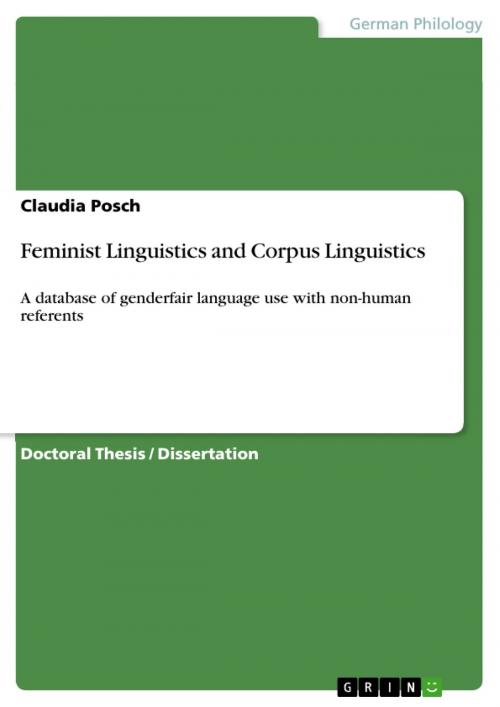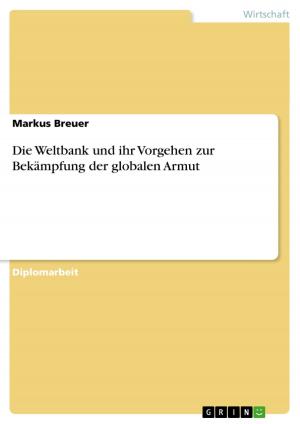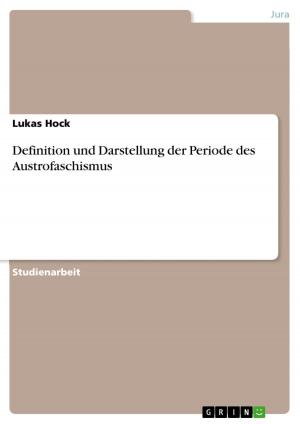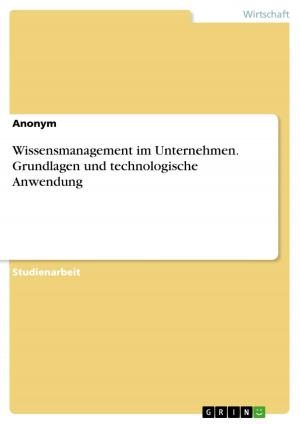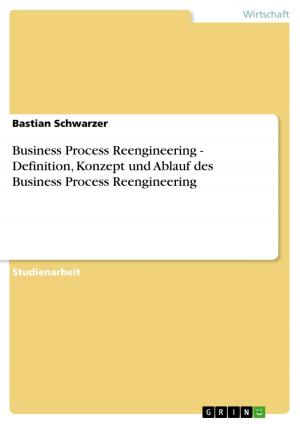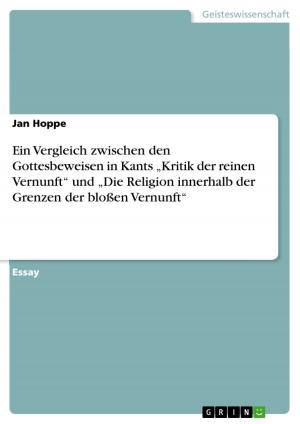Feminist Linguistics and Corpus Linguistics
A database of genderfair language use with non-human referents
Fiction & Literature, Literary Theory & Criticism, European, German| Author: | Claudia Posch | ISBN: | 9783656615910 |
| Publisher: | GRIN Verlag | Publication: | March 17, 2014 |
| Imprint: | GRIN Verlag | Language: | English |
| Author: | Claudia Posch |
| ISBN: | 9783656615910 |
| Publisher: | GRIN Verlag |
| Publication: | March 17, 2014 |
| Imprint: | GRIN Verlag |
| Language: | English |
Doctoral Thesis / Dissertation from the year 2009 in the subject German Studies - Linguistics, grade: 1,0, University of Innsbruck (Institut für Sprachen und Literaturen: Sprachwissenschaft), course: Linguistics, language: English, abstract: This book is a revised version of a dissertation completed in 2009. A corpus-based study on German personal reference, more specifically the sex-marker '-in', is at its core. Grammatical gender in German is often stated to be independent of the notion of sex (or gender in the sense of Butler 2004, respectively), even if some residual relation is acknowledged at least for personal appellation (cf. Kalverkämper 1997, Ulrich 1997). The present study investigates the usage of '-in' with inanimate referents (also called 'non-personal agents'). One main question here is, if grammatical gender influences the ways in which we construct such non-personal agents (cf. Jobin 2004). According to Goschler (2005), there is a strong tendency to anthropomorphism in language, thus when we personify things we also 'engender' them by using grammatical gender as an indicator for the gender of the target metaphor. In German, such congruency normally would not be necessary. Women can without problem be referred to by the masculine form. But in some cases with inanimate referents congruency is made: Die Firma Minolta Austria Bürosysteme, Anbieterin von Kopierern, Faxgeräten und Laserprintern [...]' (N91/DEZ.25705). 'The company-FEM Minolta Austria Bürosysteme, provider-FEM of copying and fax machines and laser printers [...]' In the book, a combined method from computer and corpus linguistics was implemented in order to create useful data. The major research tool was COSMAS II, a corpus application, with which the German reference corpus (3,6 Billion words) can be accessed. Research resulted in a comprehensive database from which the study of grammatical gender in German could benefit. Results indicate that, if non-personal agents are understood as juristic personae, grammatical gender does not automatically determine if the sex marker '-in' is used.
Doctoral Thesis / Dissertation from the year 2009 in the subject German Studies - Linguistics, grade: 1,0, University of Innsbruck (Institut für Sprachen und Literaturen: Sprachwissenschaft), course: Linguistics, language: English, abstract: This book is a revised version of a dissertation completed in 2009. A corpus-based study on German personal reference, more specifically the sex-marker '-in', is at its core. Grammatical gender in German is often stated to be independent of the notion of sex (or gender in the sense of Butler 2004, respectively), even if some residual relation is acknowledged at least for personal appellation (cf. Kalverkämper 1997, Ulrich 1997). The present study investigates the usage of '-in' with inanimate referents (also called 'non-personal agents'). One main question here is, if grammatical gender influences the ways in which we construct such non-personal agents (cf. Jobin 2004). According to Goschler (2005), there is a strong tendency to anthropomorphism in language, thus when we personify things we also 'engender' them by using grammatical gender as an indicator for the gender of the target metaphor. In German, such congruency normally would not be necessary. Women can without problem be referred to by the masculine form. But in some cases with inanimate referents congruency is made: Die Firma Minolta Austria Bürosysteme, Anbieterin von Kopierern, Faxgeräten und Laserprintern [...]' (N91/DEZ.25705). 'The company-FEM Minolta Austria Bürosysteme, provider-FEM of copying and fax machines and laser printers [...]' In the book, a combined method from computer and corpus linguistics was implemented in order to create useful data. The major research tool was COSMAS II, a corpus application, with which the German reference corpus (3,6 Billion words) can be accessed. Research resulted in a comprehensive database from which the study of grammatical gender in German could benefit. Results indicate that, if non-personal agents are understood as juristic personae, grammatical gender does not automatically determine if the sex marker '-in' is used.
